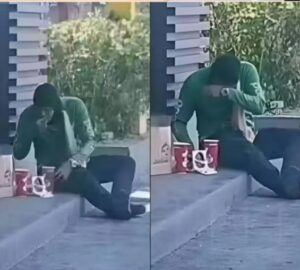The city never sleeps. Neither did Ramon Dela Cruz, a 37-year-old delivery driver from Quezon City. Every morning before dawn, he would start his old motorbike, kiss his wife, and whisper, “I’ll be home before dinner.” But that night, dinner never came.

It started with a simple food order — ₱1,200 worth of meals for an “office party” in Cubao. Ramon had been working since 5 a.m., exhausted and hungry, yet hopeful. That order meant he could finally buy medicine for his wife, who’d been struggling with a lingering cough, and maybe bring home some fried chicken for his kids. He smiled under his helmet as he imagined their faces.
When he arrived at the address, he called the number.
No answer.
He called again. And again.
Still nothing.
Finally, after 15 minutes, he went up the building stairs, searching for any sign of the customer. A security guard looked at him with pity.
“Sir, no one lives there anymore. That office closed weeks ago.”
Ramon froze. He looked down at the food in his hands — still warm, still smelling of home — and felt his throat tighten. The order had been fake. The number was disconnected. The address was empty.
He sat on the curb outside, staring at the meals he had just paid for out of his own pocket. For riders like him, “cash on delivery” meant his money until the customer accepted it. Now, all that remained was a bag of food and a heart that sank with every passing second.
“I just wanted to buy medicine for my wife,” he whispered.
“How do I tell my kids there’s no dinner tonight?”
People walked by without noticing the man sitting quietly by the streetlight, his delivery bag open beside him, his helmet still on. The city kept moving, but for Ramon, time had stopped.
Then something unexpected happened.
A young woman named Alyssa — an office worker on her way home — slowed down as she passed him. She had seen many delivery drivers before, but something about the way Ramon sat — still, broken, like someone who had given up — made her turn around.
“Kuya, are you okay?” she asked softly.
Ramon looked up, startled. For a moment, he didn’t know what to say. Then the words spilled out: how the order was fake, how his wife was sick, how he didn’t have enough left for even a jeepney ride home.
Alyssa’s eyes filled with tears. She took out her wallet. “Wait here,” she said. Then she bought two bottles of water and sat beside him.
They talked for almost an hour — about life, struggle, and how cruel the world could be to the kind. She learned that Ramon used to be a mechanic before losing his job during the pandemic, and that delivering food was his only way to survive.
Without saying a word, Alyssa took a photo of the uneaten food and posted it on social media with the caption:
“This man was scammed out of his day’s pay. All he wanted was to feed his family. Please, let’s help him.”
She didn’t expect what happened next.
Within hours, her post exploded. Thousands of people shared Ramon’s story. Strangers sent messages asking how they could help. Donations poured in — some offering money, others groceries, even a new motorbike. Local news stations picked up the story, calling Ramon “The Honest Rider with the Broken Heart.”
When reporters found him the next morning, he was still in disbelief. His wife stood beside him, tears in her eyes, holding the bag of groceries someone had delivered to their small home.
“I didn’t think anyone cared,” Ramon said quietly.
“I just wanted to do my job.”
But people did care. His story became a symbol of hope — a reminder that even in a world full of scams and cruelty, kindness still finds a way through. The delivery company, upon hearing what happened, offered him a new position and compensation for his loss.
Days later, Ramon visited Alyssa at her office. He handed her a small plastic container wrapped in foil.
“What’s this?” she asked.
“Adobo,” he smiled shyly. “My wife cooked it. She said to thank the woman who gave us back our hope.”
They laughed, and for a moment, the chaos of the city seemed to fade.
Months passed, but people still talked about him — the man who kept his integrity even when life broke him down. Ramon continued to deliver food, but things had changed. Now, every time he rode through the busy streets, people waved, smiled, and sometimes handed him small notes that said, “Keep going, Kuya. You’re an inspiration.”
One evening, as the sun dipped below the skyline, he parked his motorbike outside his home. His wife greeted him at the door, healthier now, their children running to hug his legs. He smiled — tired but peaceful.
“Papa, are you famous now?” his daughter giggled.
“No,” he replied, lifting her into his arms. “I’m just someone who didn’t give up.”
And as the night settled over Quezon City, the man who once sat alone on the sidewalk now sat with his family around a warm meal — proof that sometimes, all it takes is one act of kindness to turn despair into light.
Because heroes aren’t always the ones we see on TV.
Sometimes, they’re just people like Ramon — doing their best, one delivery at a time.





